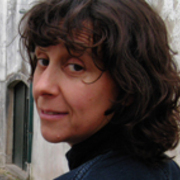
Alison Maclean
Alison Maclean was born in Ottawa, Canada, in 1958, to New Zealand-born parents.
She emigrated to New Zealand as a teenager, and later attended Elam Art School in Auckland. She got a holiday job as an assistant director on moody feature Strata, then met producer Bridget Ikin while working on Vincent Ward's Vigil. Maclean and Ikin would collaborate on a number of short films. The first was Taunt (1983), an experimental film scripted, shot, edited and directed by Maclean in her final year at Elam.
In 1987 the duo collaborated on 48-minute drama Talkback (1987), about the unusual relationship between a woman forced to become a late-night radio host (Lucy Sheehan), and a sometimes antagonistic caller (Peter Tait). Talkback was the first of two consecutive Maclean-directed films to take away the Listener award for best local short. Writing for NZ On Screen, critic Costa Botes argued that "the fact that this remarkable film has somewhat slipped between the cracks of critical regard says more about the unfairly low status accorded short films than anything else. It's a wonderfully assured piece of drama."
Short film Kitchen Sink, a surreal suburban nightmare, burst onto the international scene in 1989. Starring a young Theresa Healey, the monochrome mixture of horror and romance won eight international awards. Maclean argued that the near wordless tale didn't fit into any particular genre. "The story came to me in much the same way as events unfold for the woman in the film. I could see this hair sticking out of the plughole and on closer inspection, the story began to emerge and to transform itself in quite a surprising way."Arguably the most successful short film to come from New Zealand, Kitchen Sink became the first Kiwi short invited to compete at the Cannes Film Festival. It was later screened as part of a ‘best of' Sundance retrospective at UCLA's Hammer Museum.
Maclean's debut feature Crush (1992) was invited to play in competition at Cannes. It was the only debut feature in competition. Produced by Ikin and starring American Marcia Gay Harden, it won praise from a range of critics; Moving Pictures International editor Nick Roddick called it an "extraordinary debut feature". As in her earlier shorts, moral or sexual ambiguity pervades the narrative of conflicted desire and passion. Its mix of blocked-up writer, spurting mud-pools, infatuated teen, American femme fatale, noir motels, limp Pongas, twisted metal and wheelchairs, plays out in a symbolic New Zealand landscape not seen before (or since!).
Maclean moved to New York in 1992. After several years developing projects she got her second feature, Jesus' Son (1999), starring Billy Crudup and Samantha Morton (plus Holly Hunter, Dennis Hopper and Jack Black). The film was shot in 34 days, a number of them stretching to 18 hours. Based on the volume of short stories by cult US writer Denis Johnson, the film is coloured by the mix of the disturbing and comical that characterises Maclean's work.
At the 1999 Venice Film Festival Jesus' Son won the the OCIC Catholic Award, and the Little Golden Lion (not to be confused with the festival's supreme award), voted by a select panel of Italian high school students. The New York Times, Los Angeles Times and critic Roger Ebert all rated it one of the 10 best films of the year. Rolling Stone's Peter Travers called it "mesmerising". Premiere went for "a lively, quirky, lyrically rambling meditation on life, death, and fate among the narcotically numbed-out, arguing the film had "more laughs, wisdom, and tragedy than most putatively high-minded productions."
Maclean's films are often driven by idiosyncratic loners isolated by their personalities or situations: FH in Jesus' Son, Lane or Angela in Crush, and the woman in Kitchen Sink.
In 2004, Maclean further explored that idea in documentary Persons of Interest, a series of interviews with New York Arabs and Muslims detained on immigration charges after September 11. Co-directed with Tobias Perse, the film was selected for Sundance and the International Human Rights Watch Festival.
Maclean has continued to direct shorts, including Intolerable (2006) and The Choices We Make, a sex education film for teens, as well as numerous TV commercials and music videos (notably the promo for Natalie Imbruglia's 1998 hit Torn).
After reading acclaimed Eleanor Catton novel The Rehearsal, Maclean called her old friend Bridget Ikin, enthused about the idea of making another movie back in New Zealand. The plotline incorporates a sex scandal involving a teenager, which inspires a theatre production by a group of drama students. The cast of Maclean's screen adaptation includes James Rolleston (Boy), Kerry Fox (as the drama school's intimidating leader) and, as one of the teachers, former Toi Whakaari teacher Miranda Harcourt. Since making its debut at the 2016 NZ international Film Festival, it has won generally upbeat reviews.
Maclean's work for the small screen includes directing episodes of Sex and the City, Carnivale, The L-Word, Homicide and The Tudors.
Whether working within the limits of a network TV series or exploring personal stories in arthouse films, Maclean's diverse output manages consistently to subvert expectations in ways that are surprising and entertaining.
Sources include
Costa Botes, 'Talkback' NZ On Screen website. Loaded 14 October 2008. Accessed 23 July 2018
Anthony Kaufman. 'ND/NF INTERVIEW: Alison Maclean's Acclaimed Second Coming with Jesus' Son' IndieWIRE website. Loaded 6 April 2000. Accessed 23 July 2018
Peter Travers, 'Jesus' Son' (Review) - Rolling Stone, 18 December 2000
Philip Wakefield, 'Short Worth a Look' - The Evening Post, July 1988